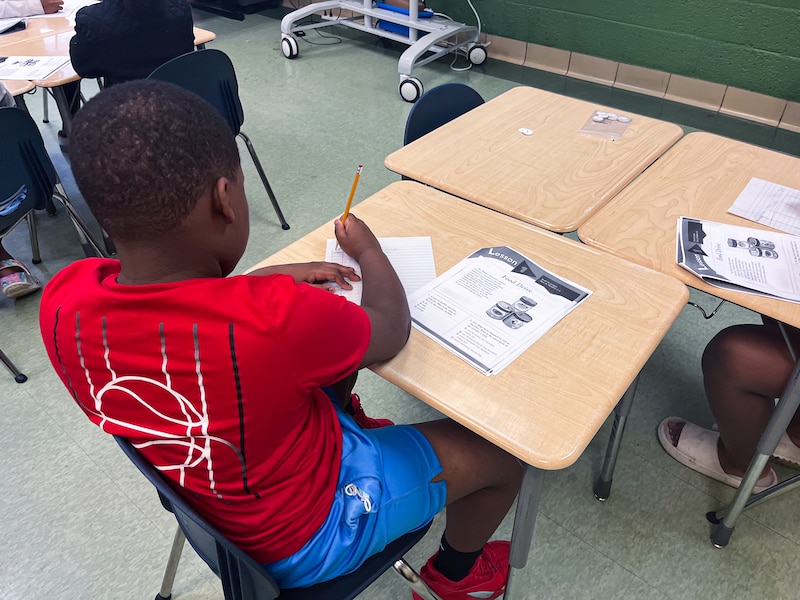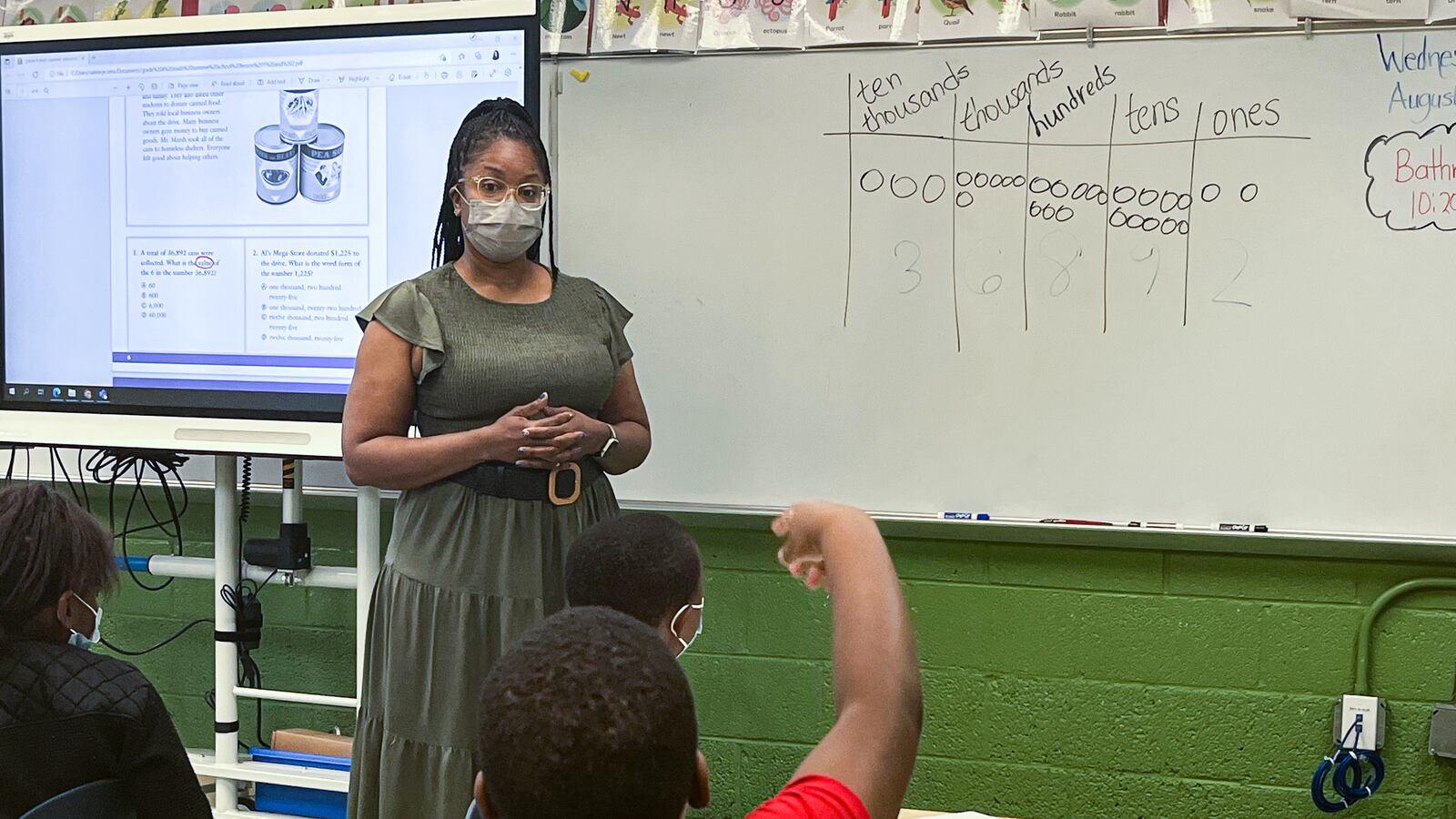In a summer-school classroom at Detroit’s Foreign Language Immersion and Cultural Studies School, Aladdin Posey and his third-grade classmates were given a math problem to solve: Organize the digits in the number “36,892” into their respective place values — ones, tens, hundreds, and so forth.
Aladdin glanced at his seat partner’s paper, then hurriedly changed the numbers on his own table, before instructor Natalege Sims stopped him.
“I don’t want you to change it to what she put … ,” Sims said. “Because mistakes are proof that you’re — what?”
“Trying!” the seven-student math class responded in unison.
Over at Detroit Public Schools Community District headquarters, Superintendent Nikolai Vitti has a tough math problem to solve, too: Across the district, student math performance, which was already alarmingly low before the pandemic, has gotten even worse since then.
“A lot of the attention has been on literacy as far as the pandemic is concerned, but the actual impact of the pandemic was seen largely in math more so than literacy,” Vitti said in a July school board meeting. The trend has been mirrored nationwide.
Sims’ summer class was one of many pockets of support across the district for students who need the most help, made possible by the $500-per-student in federal COVID relief funds that individual schools in the district received. The lesson used problem packets, multicolored place-value coins and other materials from Curriculum Associates’ Focus on Mathematics program.
But for all the money and trying, district officials are still laboring without a clear formula for how best to tackle the problem. While there’s growing consensus on the benefits of one-on-one and small-group tutoring for literacy education, math experts and educators continue to debate the most effective solutions to the more recent learning loss and the longstanding insufficiencies that have plagued math education in Detroit and across the country.
Intensive tutoring is one near-term solution some experts have proposed. But DPSCD hasn’t been able to find enough vendors or people available to provide tutoring services at the scale it needs. That has left officials scrambling to come up with a comprehensive, district-wide approach to math intervention.
Left unchecked, the math learning loss could have grave long-term implications, experts say. Children who miss out on quality K-12 math education risk failing out of beginner-level math and science courses in higher education and may lack the kind of quantitative literacy needed to decipher life-or-death information, such as medical risks.
How online learning during the pandemic undermined math learning
At the end of the 2020-21 school year, 26% of DPSCD students who took the end-of-year iReady assessment for reading were scoring three or more grades below the standard — a 1.6-percentage point increase from 2018-19 school year.
But the blow to math learning over that same period was greater: At the end of 2020-21, 24% of students who took the test scored three or more grades below the math grade standard — a 5.8-percentage-point increase from before the pandemic.
On Michigan’s high-stakes standardized exam, the Michigan Student Test of Educational Progress, math performance was similarly troubling last school year. The percentage of students in grades 3-7 who were proficient on the exam was 6.2%, according to results released Sept. 1. That’s down from pre-pandemic levels of nearly 14% in 2018-19.
Detroit isn’t struggling alone. A handful of national studies from Curriculum Associates and the education research group NWEA indicate that since the pandemic, more of America’s K-12 students are scoring two or more grade levels below the standard in math than in reading.
In Detroit, Vitti attributed the gap to the fact that “foundational principles of math” were particularly difficult to teach and learn online.
Outside experts say there’s something to this. Teaching math well involves being able to physically circulate the room and see how the students are taking in the content by observing what they’re expressing on their faces and on paper, said Kevin Dykema, president-elect of the National Council of Teachers of Mathematics. The switch to virtual learning prevented teachers from being able to do that.
Sims remembers how, in December 2021, when DPSCD switched to online school for three Fridays of the month, teaching math to her third-grade students at Bates Academy became trickier.
Sims said she had gotten used to observing their body language and inviting them to share their work on the whiteboard to track their learning. Being online meant she suddenly had to rely on online platforms like Schoology to gather work from students. And they had to do without “manipulatives,” or tangible objects like place-value coins or popsicle sticks used to visualize math concepts.
A lot of her third-graders passed up the online platforms and stuck with old-fashioned pencil-and-paper work. Students would do their work on a piece of paper and hold it up to their laptop camera or take a picture of their work with their phone and send it in, Sims said.
Some experts say the stress of the pandemic worsened students’ existing math anxiety, causing them to feel tense and distracted in remote class.
Determining which students need intervention and deciphering how students are communicating their math needs are two of the trickiest parts of remote teaching, said Tamala Wiley, director of business development for Teaching Lab, a nonprofit organization specializing in teacher professional learning.
Detroit struggles to find tutoring vendors
Acknowledging the profound impact of the pandemic on education, the federal government appropriated $190 billion in COVID relief funds to America’s schools throughout 2020 and 2021, but left it largely to states and district leaders to figure out how to spend it in the interest of student success. Detroit received nearly $1.3 billion of these funds.
For many districts, including Detroit, the spending plans have involved offering intensive tutoring to help students recover from learning loss. Some states, such as Oklahoma, Arkansas and Tennessee, launched their own statewide tutoring programs for reading and math. Michigan did not, so the Detroit district has worked primarily with outside vendors.
The school board recently voted to renew a contract with Beyond Basics, a literacy nonprofit, to provide one-on-one reading intervention to over a thousand of the district’s K-12 students. The initial contract, valued at $9 million to $12.62 million, was paid for largely by COVID relief funds and money DPSCD received after settling the federal “right to read” lawsuit.
There has been no commitment yet on that scale for math intervention. It’s not for lack of trying.
More than a year ago, the district put out a request for proposals notifying 22 math tutoring services of the district’s need for Tier 2 and Tier 3 math intervention for more than 1,000 students beginning fall 2021. Tier 2 intervention involves teacher-led small group support, and Tier 3 intervention involves one-on-one support.
Ultimately, the district didn’t find a vendor that could handle the job.
“We did not believe that the vendors who applied to do so had the ability to scale across multiple schools and provide direct math intervention to students,” Vitti said. “The vendors may have had products for intervention, but we were looking for the product and people to provide that intervention, as we did with literacy.”
Experts find the lack of math tutors in Detroit unsurprising, given similar shortages nationwide. People qualified in math education are opting for higher-paying teaching jobs over tutoring jobs, said Dykema, from the National Council of Teachers of Mathematics.
Tony Hawk, DPSCD’s executive director of K-12 mathematics, identified math and science as “critical shortage areas” for qualified personnel to hire as teachers or tutors.
Without the resources for a district-wide initiative, the district is targeting math intervention at individual schools, which can use a mix of school-based Title 1 funding, COVID relief funding, and general fund discretionary dollars to arrange math tutoring.

Following requirements outlined by the Michigan Department of Education, the district analyzes school-specific data to determine which schools should receive more support, said Leenet Campbell-Williams, the assistant superintendent of curriculum and instruction.
Just last month, the school board approved a $319,500 contract with Math Corps, a nonprofit tutoring group housed at Wayne State University, to provide Tier 2 and Tier 3 support for students at Martin Luther King Jr. Senior High School.
Select K-8 schools get math tutoring services from City Year, a volunteer-based AmeriCorps program, and use the Focus on Math instructional resources from Curriculum Associates.
In Aladdin’s summer school class, Sims uses the Focus on Math multicolored place-value coins and other handheld tools to help students grasp concepts.
“That way when students say they’re ‘carrying the one,’ they’re really carrying it,” Sims said.
Meanwhile, the district is looking for longer-term solutions. After struggling to find outside support, DPSCD plans to build up its internal resources, investing in academic interventionists, peer educators, and its current teachers to offer math intervention across the district, Hawk said.
Dykema says his organization has seen the same strategy of investing in classroom teachers adopted in other urban districts, such as Baltimore, Washington D.C., and the Tampa area.
The long-term focus will benefit students long after the COVID dollars run out, he said.
Grace Tucker is a reporting intern at Chalkbeat Detroit. Reach her at gtucker@chalkbeat.org.


